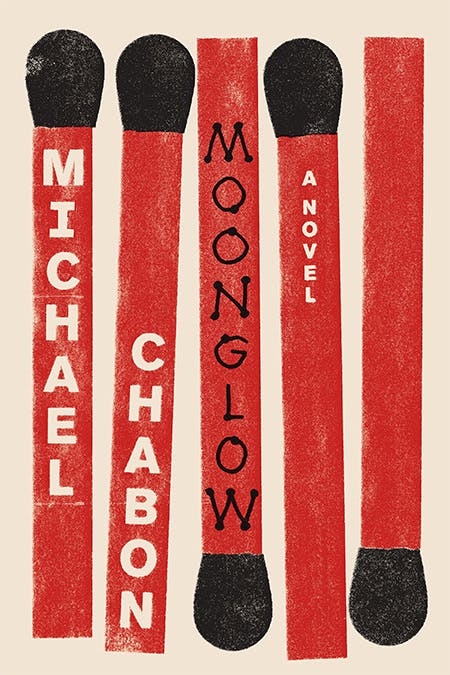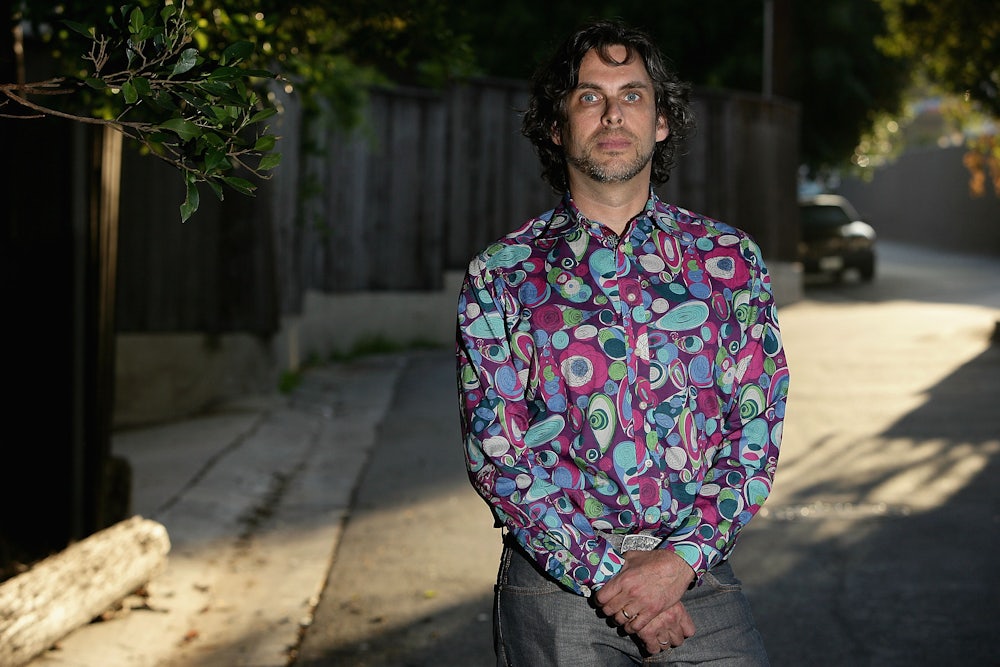Writing about one’s own grandparents presents both a paradox and a possibility. All the things they did and who they were and how they lived—not to mention the traumas they suffered—all shove us in the back as we become adults, aware of the particular ways they might have screwed up our parents (who, in turn, have screwed us up). But by the time we finally become curious to hear about their lives, the stories have all hardened, taking on exaggerated and unnaturally bright color, like marbles that we can swish around in our mouths but never chew.

That’s the paradox. The possibility, which Michael Chabon has embraced “with abandon” in his new book, Moonglow, is that when you squint across that great generational chasm at their blurry forms, you can see what you want to see. You can let your imagination run wild.
And boy did he. Chabon’s new book, Moonglow, is a novel masquerading as a memoir about his grandparents. If his actual grandparents are even a little bit like the unnamed “grandfather” and “grandmother” in this telling, it’s no wonder they became the stuff of myth for him. In this book, his maternal grandmother was a French refugee with a concentration camp tattoo on her arm. She arrived in America after World War II with a little girl, Chabon’s mother, and in the 1950s became a late-night horror TV show host named “Nevermore, the Night Witch.” His South Philadelphia-born grandfather spent World War II with the CIA-precursor Office of Selective Services, hunting all over Europe for Wernher Van Braun, the Nazi creator of the V-2 rocket. He married that enigmatic Frenchwoman, and ended up in an upstate New York prison for two years for strangling his boss with a telephone chord. Behind bars he managed to invent a model rocket that would launch a successful toy company.
These are the larger-than-life grandparents of the “Mike” who tells this story, though we are never told just how closely they are supposed to resemble Chabon’s own family members. A brief “Author’s Note” makes his obfuscation very clear: “I have stuck to facts except when facts refused to conform with memory, narrative purpose, or the truth as I prefer to understand it.” This still leaves open the question of whether he’s enrolled in the very au courant Knausgaard school of writing under the classification of fiction only to give more freedom for unfettered memoir. Or is he just playing with the genre of memoir (more in the Rothian school, let’s say) as he makes the whole thing up?
Ever since moving on from his early autobiographical works, The Mysteries of Pittsburgh and Wonderboys, Chabon has consistently drawn inspiration from the counterfactual, from a kind of Twilight Zone tweaking of reality. He created a frosty Alaskan promised land for the Jews in The Yiddish Policeman’s Union. In The Amazing Adventures Kavalier & Klay, he imagined an off-kilter version of the lives of the Jewish early comic book gods, Jerry Seigel and Joe Schuster. Even Telegraph Avenue, his latest and most distinctly realist in a long time, had that strange scene at a political fundraiser when State Senator Barack Obama of Illinois starts chatting it up with the characters. So it’s perhaps no surprise that he would one day put his own name between quotation marks.
Moonglow unfolds as a deathbed confession. In 1990, “Mike,” then in his early twenties, arrives in Oakland to find his grandfather, sick with bone cancer and in his last hours, installed in a bed at his mother’s apartment. Aside from raspberry Jell-O and chicken soup, the grandfather is taking regular 20 milligram doses of Diluadid, a pain killer that acts as this book’s fuel, loosening the tongue and mind of a naturally taciturn, tough man. “Out flowed a record of his misadventures, his ambiguous luck, his feats and failures of timing and nerve,” Chabon writes. What he learns in those few days about his grandfather’s life—and, crucially, by extension, his grandmother’s—is more than he’d ever heard. “Did I tell you,” the grandfather begins, “about the time I dropped a kitten out the window?”
These musings propel us in no discernible chronological order through a full existence, from the 1920s and the first time he glimpsed a naked woman all the way to his last year of life, 1989, and a romance sparked with another resident of his Floridian retirement community. Mingling with these memories are Mike’s own childhood recollections of visiting with his grandparents in overheated apartments in the Bronx and the Upper West Side of Manhattan, and sessions with his mother in which they both try to scratch at the truth of his grandparents’ lives.
This grandfather feels distinctly like a Michael Chabon creation. There’s his obsession with space flight and all its accompanying esoterica—the numbers of missions, the various types of rockets. This is a family memoir with many footnotes and a long digression on Thomas Pynchon and Gravity’s Rainbow. And there is something contrived—Forrest Gumpish—in the way the character always gives Chabon an opportunity to introduce exciting factoids of 20th century history. Here he is meeting Wild Bill Donovan, founder of the CIA. There he is in Europe, in the concentration camp, Dora-Mittelbau, where Van Braun built his V-2 rockets with slave labor. And again, he shows up in the 1980s employed by NASA to make a miniature model of the ill-fated Challenger spaceship.
Then there’s Chabon’s tick as a writer: nerd fiction—whether it’s the world of early comic books in Kavalier and Clay or the endless LP titles sprinkled throughout Telegraph Avenue. (Let’s just hope he’s not also into stamp collecting). He’s forever the geeky completest, the 5th grader at recess thrusting his mint condition 1984 Don Mattingly Topps baseball card into your face. When the grandfather’s new girlfriend enters his apartment in the retirement community for the first time, she is shocked to find model rockets everywhere. “On every available horizontal surface: the coffee table, the bookshelves, on top of the television set. French Arianes, Japenese Mus, Chinese CZs, and Argentine Gamma Centaura … She could see the incredible detail, the antennae and hatch hinges, the care that had been taken with pain and identifying markings and national symbols.” This could very well be a view of the inside of Chabon’s brain.
If Moonglow was only a chronicle of this taciturn and obsessive, yet highly competent man, it would be a disappointing work from such a consistently talented writer—nothing more than the invention of an elaborate origin story for himself.
What elevates it all is the figure of Chabon’s grandmother, a charismatic manic depressive whose erratic behavior—setting fire to the family’s hickory tree in front of their New Jersey farmhouse; being pursued by an imagined monster out of her past, known only as the “Skinless Horse”; baking and then eating a whole tarte tatin with her grandson and then moodily retreating to her darkened room—give the book humanity. Even the grandfather’s story warms when it touches on his struggle to construct a life with someone he loves so deeply but who is also damaged beyond repair. Again and again, we return to a heartbreaking image of him building a model of a lunar settlement—which we learn, of course, took 14 years and about 22,000 individual polystyrene pieces—in which he embeds, below ground, a tiny family, his own, huddled together, cozy and protected from all the outside terrors, present and historical.
The best sections in the book are Chabon’s own memories of this troubled woman who always traveled in a cloud of Chanel No. 5—or Mike’s memories, I should say. As a child, he began to intuit her strangeness and murky past. He finds a deck of hidden tarot-like cards and she tells him they were a remnant of her time as a witch—and, indeed, for a period in the early 1950s until her first major mental breakdown, she played one on late night local television. In one long evocative section he describes an afternoon spent with her while his mother was in the hospital following a miscarriage. She attempts to cheer him up and distract him by dressing them both up as cowboys, and calling herself Tumblesweed Bill. She is comforting, but also unsettling. Darkness descends over her suddenly in the form of a migraine, forcing her to retreat to her bedroom, leaving him to build a house of cards with her spooky deck.
“Generally speaking, in the course of your life with her, in her expressions of emotion and the patterns of her thought, would you say that there was a … coherence to her? What we might call her presentation of self? Did it feel consistent?” This is what the psychiatrist asks Mike’s grandfather when he goes to pick up his wife from a mental institution in 1958. Without revealing what he can’t, the psychiatrist suggests that he has been privy to a far more disturbing story of how she survived the war than the one she’d told her family of being hidden by Carmelite Nuns while her parents were sent to Auschwitz and the father of her child (a Catholic doctor) was shot by the occupying SS. Much later, after everyone is dead, Mike will uncover this alternative story, one, he writes, that “messed me up for a long time.” It’s possible, though, we’re also lead to believe, that maybe this narrative too is not the whole truth.
So what do we make of this fake memoir, with, at its center, a woman struggling to maintain sanity in the absence of a coherent life story, nothing that ties her past to her present? Chabon’s bigger point, both in form and content, is that narrative is our existential duct tape. The stories we tell ourselves about ourselves are flimsy things, but if we don’t keep repeating them, we easily fall apart. Sitting at his grandparents table as a boy, building his house of cards as his grandmother nurses unknown pains in her room, Chabon considers the structure as it collapses:
I understood: Everything got ruined and nothing was ever finished. The world, like the Tower of Babel or my grandmother’s deck of cards, was made out of stories, and it was always on the verge of collapse. That was proverbial.
It is proverbial. But it’s somehow less numbingly obvious in Chabon’s hands. Maybe it has to do with how particular and real these characters feel; or that this is a memoir about grandparents that so fully complicates the notion that their lives are the prepackaged, finished objects they always seem to be by the time we encounter them. They are not, Chabon is saying. They don’t begin or end. They are recreated and refurbished, first by them and then by us, until finally no one remembers anymore the detail and color. And that’s when they really die.
